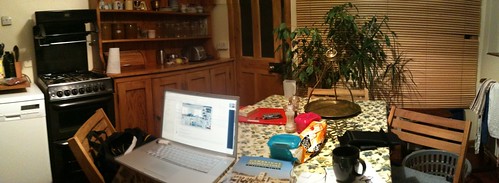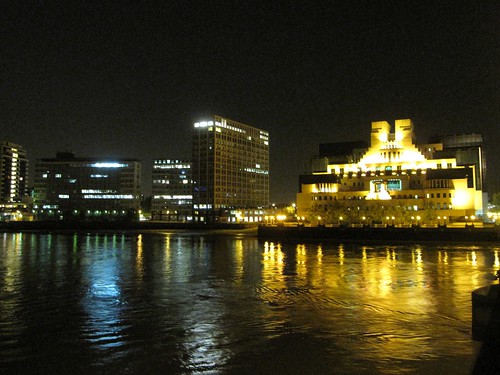I’m old enough to remember how traveling internationally in the 1970s and and 1980s meant communicating through letters or occasional expensive phone calls.
At the same time, I’ve really liked being able to keep in touch with family when I’ve traveled, and the existence of Skype and email made it a lot easier for my wife and I to go to Cambridge and leave the kids at home (with my mother, not just a few cases of ramen noodles). We Skyped with them daily.

keeping in touch with the kids, via flickr
Trinity University professor Robert Huesca spent six months in Ouidah, Benin, and has a piece in the latest Chronicle of Higher Education arguing that Facebook Can Ruin Study Abroad. He and his fellow visitors all “came equipped with various levels of advanced electronics, including computers, mobile phones, digital cameras, iPads, iPods, and other media players loaded with movies, television programs, and music,” not to mention access to Facebook, IM and Skype. He argues that “online communication constitutes a vortex that consumes hours of a traveler’s time,” and that too many people studying abroad listen to the same music, watch the same movies, and talk to the same people they do when at home– which means they spend less time exploring their local environments, or going through the uncomfortable but ultimately valuable experiences of dealing with culture shock and dislocation.
The corrosive consequences of new communication technologies are evident when the hours spent chatting online, listening to a homegrown playlist, or watching television reruns take time away from conversing with a local friend, hearing a native song, or learning an indigenous dance or game….
If the Internet and social media allow study abroad students to live within a protective “bubble” (call it a cultural comfort zone) of life back home, the experience abroad is diminished considerably….
In the rush to protect our students and our universities through the adoption of digital technologies, we unwittingly have extinguished the necessary conditions for personal transformation that justify the expense, risk, and sacrifice of study abroad.
Of course, this is a technology-enhanced version of a couple old problems, as a couple commenters rightly point out. As one notes, “The reason they don’t experience ‘there’ is because they’ve never experienced ‘here’:” that a personal media bubble dulls your engagement with home and alma mater just as much as it does your engagement with novelty. Another commenter who’d spent time in Germany in the 1980s says that “while I’m sure technology makes it easier, even without much of it, people can ignore their surroundings and focus on themselves and their comfort group.” (This is an old complaint: you can find accounts of foreign students at Oxford in the 1700s, or Italian universities in the 1500s, who do nothing by carouse, hunt, or fight.)
I’m sympathetic to the idea that one should err in favor of making sure you’re open to new experiences and places. When my daughter went on a school trip this summer to England, I told her to ignore Facebook, precisely because I worried that her days would be less full, and she’d be less engaged with what she was experiencing, if she was posting about it at the same time. (I didn’t really need to worry. She was going with her closest friends, she’s not a big Facebook user anyway, and the last thing she was going to do was stay in touch with her parents.)
At the same time, I wouldn’t advocate leaving everything with batteries behind. When I travel alone, I go walking in the evening and take pictures as a way of connecting with the place, and I’m certain that the camera helps me observe and remember new places in a way I might not otherwise.

via night view of London, 2009, viaflickr
My Skyping with home when I was Cambridge worked in part because it could only happen at certain times of day, before and after school. Wwe have to learn how to make a choice about how to use connectedness: how to use it to make parts of our regular home life easier, and to use it as a retreat from the dislocations of being away, while still make sure you have the freedom necessary to make the most of the opportunities in front of you.